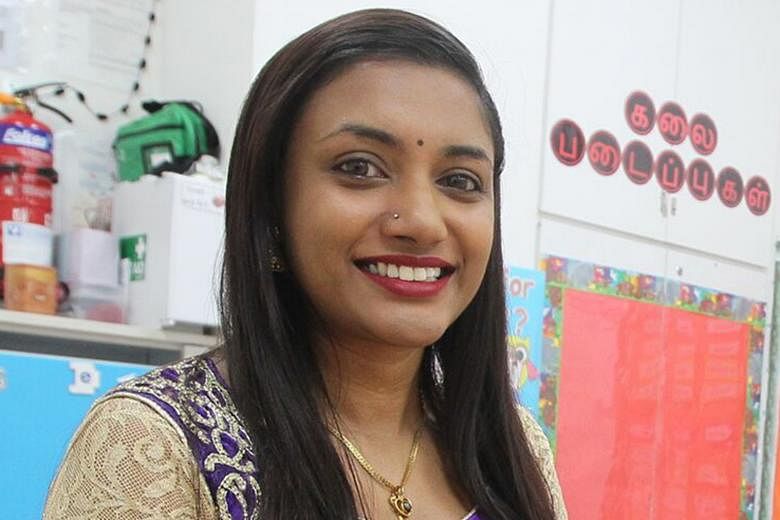Armed with a fish fresh from the market, pre-school teacher Juliana Jaysree, 24, began her lesson.
Gathering the children around, she teaches them how to name its body parts in Tamil. Fish is known as "meen" and its eyes are "kan", she said. Ms Jaysree also weaves in cultural lessons, such as Indian cuisine and how the food is consumed sometimes - on a banana leaf.
She said: "I first entered the classroom using a white board to teach. This method didn't catch their attention, and the children were not grasping the content well.
"So, six months later, I changed my method by bringing in materials and things from the real world as teaching aids for them to touch and feel."
For her efforts at PCF Sparkletots Preschool in Sembawang, Ms Jaysree is one of seven recipients of this year's Outstanding Pre-school Mother Tongue Language Teacher Award.
The other six winners in the same category are My First Skool's Ms Luo Yan Yan and Ms Xie Xiao Yan, PCF Sparkletots Preschool's Madam Pang Nuan Kee, Madam Norhaizahwati Mohd Said and Madam Rozanah Rabunam, and MOE Kindergarten's Mrs Reka Sherlin John.
The award also recognised six teachers in the merit category. The 13 award recipients were selected from a total of 96 nominations by a panel of 10 experienced pre-school educators and academics, who conducted on-site lesson observations and interviews with the teachers. The recipients received the award from Education Minister (Schools) Ng Chee Meng yesterday at the Mother Tongue Languages Symposium at Suntec Singapore Convention and Exhibition Centre.
The award, first introduced in 2009, is jointly presented by the Mother Tongue Languages Learning and Promotion Committees, and supported by the Lee Kuan Yew Fund for Bilingualism.
Madam Pang, 57, who teaches Chinese at PCF Sparkletots Preschool in Punggol, said she uses games, puzzles, flash cards and songs to get children interested. Parents can do the same at home by simply speaking to their children in Mandarin and watching educational programmes in the language, she said.
In his speech, Mr Ng said the mother tongue languages offer Singaporeans a different set of cultural lenses and perspectives to connect with the world. "A deeper appreciation of our mother tongue cultures will strengthen our multicultural identity and also build the confidence of Singaporeans to engage our counterparts in the region more effectively."


